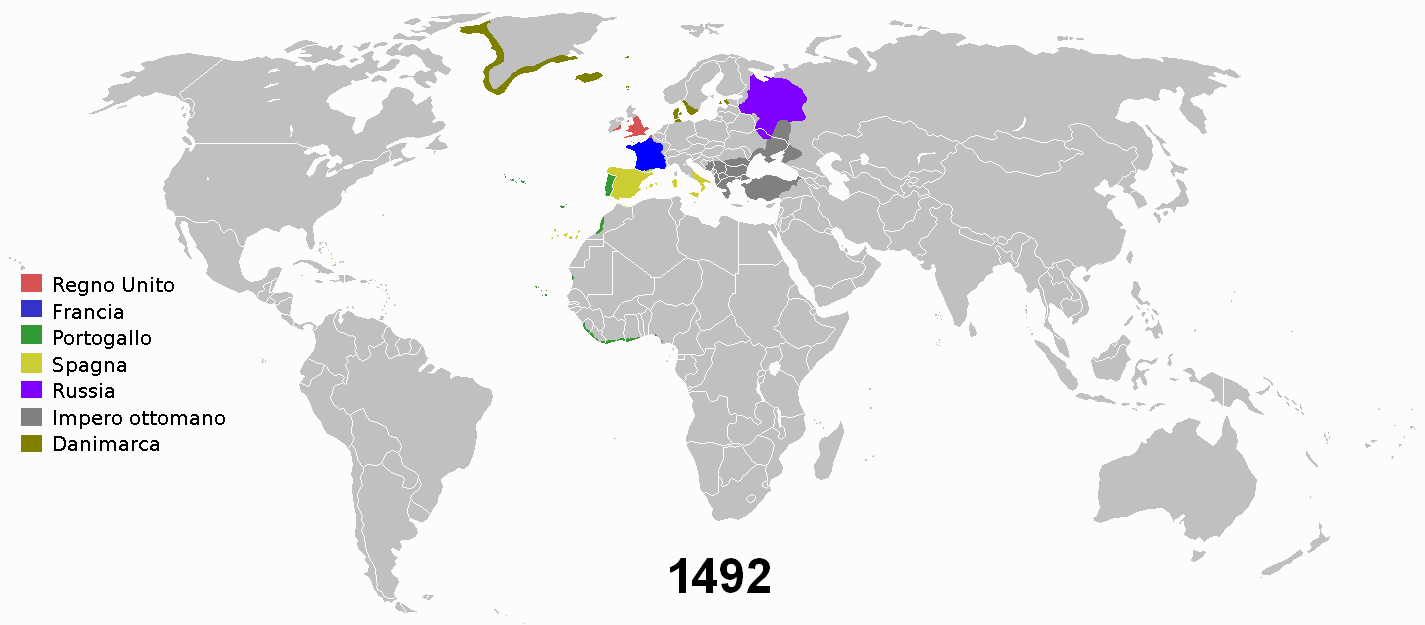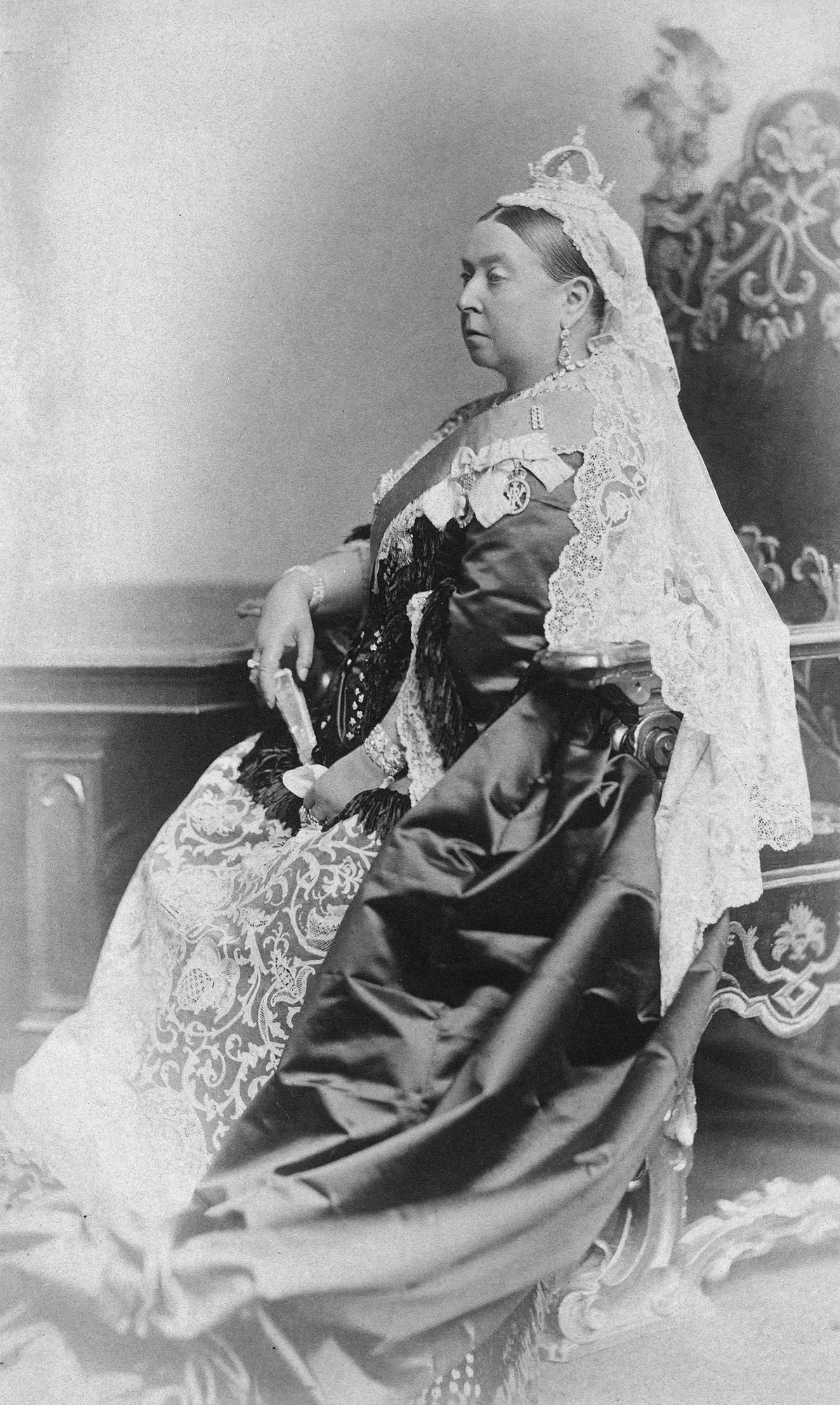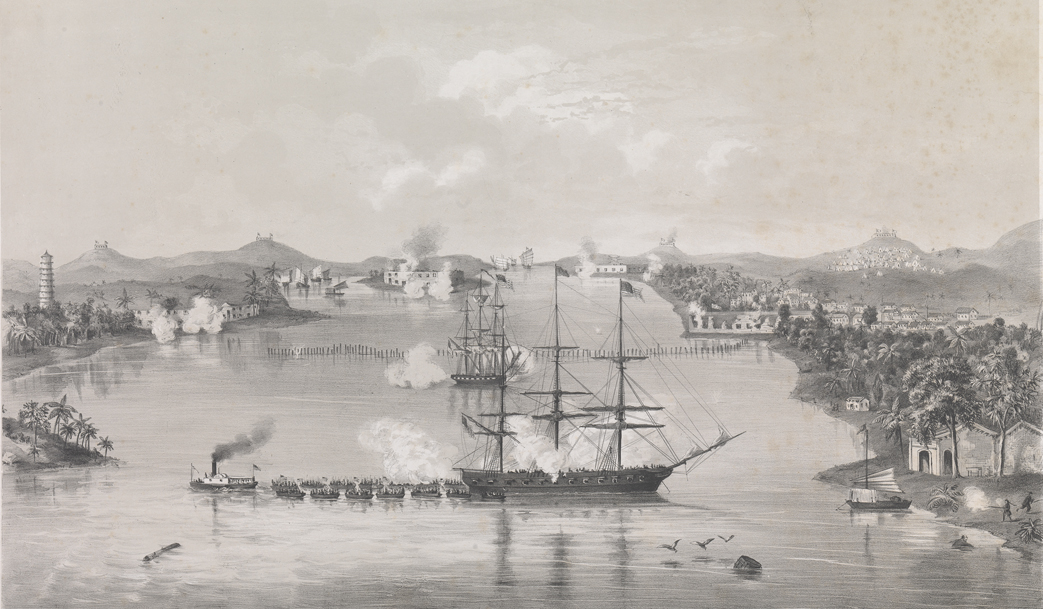Imperialism and Nation-State Formation (1750-1900 CE)

States began to industrialize, expanded their existing colonies overseas, and established new colonies. This expansion led to and affected diplomacy and warfare during modern empire-building.
Colonial empires were established with Britain, France, Holland, Scandinavia, Portugal and Spain between 1500 and 1800.
Italy, Germany, Belgium and Russia began to colonize between 1870 and 1914.
French and British possessions in Africa and Asia expanded towards 1900.
There was a massive increase of European influence as Europe led the empire-building process, although the United States and Japan were also active participants. China and India adopted western scientific ideas, technology and western education to produce scientists.
Empire-building challenged Eurasia's power of their land-based empires. Imperialism was facilitated by new concepts of race, gender, nationalism, class, and culture. It also led to anti-imperial resistance and the creation of new national identities.
Russian resistance to Sweden
Resistance in India, China, Africa and North America to British colonialism
Tribal resistance in Africa, North America and South America
Cuban resistance from Spain/Latin America resistance
The Internet Modern History Sourcebook's section on Imperialism has links to sources for China, Japan, India, Africa, and the Middle East.
 Link to
Link to
What are the similarities & differences between colonialism and imperialism?
Similarities:
- Both involve the acquisition of land, the control of another nation
Differences:
- Colonialism: This refers to the immigration of people to a new territory who still abide by the laws and customs of the mother country. Colonies tend to be more permanent than imperial satellite nations.
- Imperialism: Focused more on monetary goals rather than permanent settlement. Primary workforce comes from natives of that territory rather than immigrants/settlers from the mother country.
- Formal Imperialism: Direct rule over the new territory. Imperialist nation will insert their own people as the leaders of the imperialized territory.
- Informal Imperialism: Indirect rule over the territory. Indigenous rules over the country, rather than European rule.

Image depicting differences between Colonialism and Imperialism
I. Industrializing powers established transoceanic empires.
Queen Victoria
 Historical Biography Page on Queen Victoria
Historical Biography Page on Queen Victoria
 See also, Lin Zixu Lin Tse-Hsu Letter of Advice to Queen Victoria
See also, Lin Zixu Lin Tse-Hsu Letter of Advice to Queen Victoria
Queen Victoria 1887

Queen Victoria's changing empire
- Article describing Queen Victoria's relationship with Abdul Karim which is depicted in the movie Victoria and Abdul
Queen Victoria (1837-1901), a biography from the official website of the British monarchy.
Queen Victoria Journals offer text, images and a multimedia timeline covering the life of the monarch.
A. States with existing colonies strengthened their control over those colonies.
Which states increased their influence and control over their pre-existing colonies, and which saw their influence decrease?
- Great Britain increased its control over India
- Spain lost control of its colonies in Latin America, as their colonies successfully fought for independence
- Great Britain also lost control of its American colonies
- China increased control over their empire (Manchuria, Taiwan, Vietnam, etc.)
- Persia and the Ottoman empires control weakened (Balkans, Romania)
[Teach one illustrative example of states with existing colonies, either from the list that follows or an example of your choice: British in India, Dutch in Indonesia]
Link to more information on British Imperialism in Asia and the British Raj in India
Malala of Maiwand
- Afghan Folk hero who defeated British troops in a crucial 1880 battle during the Second Anglo-Afghan War
- Malala Yousafzai, the Afghan activist and the youngest Noble Peace Prize recipient, is named for Malala of Maiwand
B. European states, as well as the Americans and the Japanese, established empires throughout Asia and the Pacific, while Spanish and Portuguese influence declined.
How did imperialism affect Europe’s influence around the world?
- Increases due to the greater presence of European colonies throughout the world
- Spread of westernization (the West started to out produce China and Japan)
- European culture (language, religion, etc.) spread
The Dutch control almost all of Indonesia.
An overview of the British Empire and its Expansion
Visualizing Empires Decline shows the progression of empires of Britain, France, Spain and Portugal from 1800 to 2009. See also Visualizing Empires Decline Revisited.
C. Many European states used both warfare and diplomacy to establish empires in Africa.
[Teach one illustrative example of European States that established empires in Africa, either from the list that follows or an example of your choice: Britain in West Africa, Belgium in the Congo]
Berlin Conference to divide Africa between the European powers, 1885

The Berlin Conference in 1884 was called to divide African colonies among various European powers.
The Berlin Conference This site explains the Berlin Conference in detail and provides instruction for a classroom group activity. It also provides several resources such as maps and Library of Congress Papers.
This Model UN guide gives a thorough overview of the Berlin Conference. Could be combined with the previous guide for an activity.
There were limited amounts of successful resistance. One of the most notable instances of this was in Ethiopia. The battle of Adwa was between Italian and Ethiopian forces. King Menelik II lead the Ethiopians to victory. They were one of the few areas in Africa that managed to avoid imperialism.
The Europeans had made extensive improvements to firearms in the 1860's and 70's, which culminated in the development of the Maxim machine gun, which could easily gun down hundreds of soldiers.
Europeans, particularly the British, would line up in long rows in battle with the Africans. One row would fire, then get down and reload while another row opened fire. The longer range and greater accuracy of the rifles could decimate African armies. Menelik reorganized his army in the style of these Europeans, allowing him to defeat the invading Italians. Much smaller European armies could win against huge African armies due to the gap in technology.
King Leopold and the Congo
- King Leopold's Ghost, a video from Journeyman Pictures details the Congo's brutal history with its Belgian colonizers
This video shows European Scramble for Africa through a changing map.
 Two DBQs on imperialism in Africa: one from WHAP and one from AP European (note: the European is at a much higher reading level). Sample student essays and scoring guide for the world DBQ.
Two DBQs on imperialism in Africa: one from WHAP and one from AP European (note: the European is at a much higher reading level). Sample student essays and scoring guide for the world DBQ.
What methods and tactics did industrialized states use to establish and expand their empires?
- Empires offered incentives to natives (westernization, culture, protection) in exchange for their compliance
- They occupied powerful roles in court and office (eg. China in Thailand)
- They used military force to stabilize the empire
- Indirect rule (eg. In Africa Britain ruled through the natives)
- Adopting business imperialism provided a stable source of income (through the acquisition of raw materials/cash crops) which could be used to further government efforts to expand their empires
D. In some parts of their empires, Europeans established settler colonies.
[Teach one illustrative example of Europeans who established settler colonies, either from the list that follows or an example of your choice: The British in southern Africa, Australia, and New Zealand; The French in Algeria]
E. In other parts of the world, industrialized states practiced economic imperialism.
For example. the British imposed heavy tax rates without the say of the colonists, such that the economy of the U.S. was controlled almost exclusively by the intervention of the British government. It was this economic imperialism that eventually led to the revolutionary war for independence.
 |
| Attack on the Barrier Forts, Canton, China by the American squadron, 1856 |
Learn more about the Opium Wars
The First Opium War: The Anglo-Chinese War of 1839-1842, Visualizing Cultures Project, MIT
II. Imperialism influenced state formation and contraction around the world.
How did imperialism help, hurt, or change various states?
- Overall, African countries/nations were impaired by the intervention of imperialistic European nations
- The African population was largely decimated due to an increase in disease, plague, and violence
- Natives were exploited for unfair labor practices (not necessarily slavery) and raw materials were plundered by the Europeans.
- The court of colonized nations began to resemble that of Europe (for example the court of Sultan of Kedah resembled European practices)
- Trial by jury replaced supernatural practices
- Countries in South America, the Caribbean, and Latin America became predominately Spanish/Portuguese.
- Countries in Southeast Asia (ex. Philippines) became predominately Christian/Catholic.
- American colonies experienced a boom in population growth (due to British rule), which accelerated settlement and industrialization in the region
A. The expansion of U.S. and European influence over Tokugawa Japan led to the emergence of Meiji Japan.
Link to major developments in Japanese history in 19th and 20th centuries
B. The United States and Russia emulated European transoceanic imperialism by expanding their land borders and conquering neighboring territories.
View a timeline of American Imperialism
C. Anti-imperial resistance led to the contraction of the Ottoman Empire.
How did anti-imperialism affect the Ottoman Empire’s territories?
- Resistance of colonies led to the formation of independent states
- Ex. Balkans, Greece, Egypt
[Teach one illustrative example of the contraction of the Ottoman Empire, either from the list that follows or an example of your choice: The establishment of independent states in the Balkans, Semi-independence in Egypt, French and Italian colonies in North Africa, Later British influence in Egypt]
Link to developments in the Middle East before World War II
D. New states developed on the edges of existing empires.
What were the effects of nationalism on various peoples and regions?
- Nationalism started revolutions to gain independence from mother country
 Simon Bolivar's Jamaica letter of 1815 was an appeal to England to support Latin America in their fight for independence from Spain.
Simon Bolivar's Jamaica letter of 1815 was an appeal to England to support Latin America in their fight for independence from Spain.
- Anti-imperialism in the Ottoman Empire also thrived off of nationalism and helped to create new territories
- Increased racism against natives
[Teach one illustrative example of such new states, either from the list that follows or an example of your choice: The Cherokee Nation, Siam, Hawai'i, The Zulu Kingdom]
E. The development and spread of nationalism as an ideology fostered new communal identities.
Nationalism; a feeling that people have of being loyal to and proud of their country often people take an ethnocentrism towards their own country.
- The German nation during the 19th century was a perfect example
[Teach one illustrative example of nationalism, either from the list that follows or an example of your choice: The German nation, Filipino nationalism, Liberian nationalism[
III. New racial ideologies, especially Social Darwinism, facilitated and justified imperialism.
How did imperialists justify imperialism?
- The white man's burden
- Felt it was their duty as white men to help the "uncivilized" people of color through imperialism
- Poem called the "The White Man's Burden" by British poet Rudyard Kipling
- The belief that they were aiding natives through religious conversion and westernization
- Believed it was “god’s duty”
- Promise of new wealth achieved through greater access to raw materials
A way to justify the Anglo/Western supremacy was the process of eugenics. Eugenics is the study and belief that the human population can be enhanced by discouraging reproduction by persons having genetic defects or presumed to have inheritable and undesirable traits.
The Image Archive on the American Eugenics Movement is a large, interactive collection of Sterilization Laws, the social and scientific origins of the movement, and diary excerpts from eugenicists.
Social Darwinism
Although the term "Social Darwinism" did not come about until far after Charles Darwin's On the Origin of the Species (1859), the school of thought was in existence before Darwin's work.
- The most prominent Social Darwinist was a man by the name Herbert Spencer. Contrary to popular belief, evolution was not a revolutionary idea discovered by Darwin.
- In fact, Spencer's major work, Progress: Its Law and Cause (1857), was published two years before On the Origin of the Species. Spencer also, while influenced by Darwin's theory of Natural Selection, was most influenced by Thomas Malthus, a political economist.
The concept of Social Darwinism developed even further throughout the next century but was most used during the Gilded Age to explain social patterns.
- It used Darwin’s theory of survival of the fittest and applied it to nations, races and even businesses. It caught on among many and is considered to be an elitist and racist belief. It was used to describe and understand how nations can better compete, endure, and evolve into a superior nation, race, etc. This was a common view held by those in power and able to call themselves “strong.”
- People in power used Social Darwinism as a tool to fuel systemic racism and also used it as a reason to expand and take over other areas. The industrial world also took on this concept.
- They applied it to business and claimed it was natural for them to take down the competition since they were stronger. This applied to many prominent businessmen at the time along with many theorists on the then ever-growing subject on race relations.

- Click here for a learning plan on social Darwinism and their opponents.
- Click here for a learning plan on social Darwinism and the American Dream
 The children's book An ABC for Baby Patriots by Mrs. Earnest Ames helps show a mindset towards imperialism, and how that mindset could be taught at an early age. Also note that the author goes by her husband's name.
The children's book An ABC for Baby Patriots by Mrs. Earnest Ames helps show a mindset towards imperialism, and how that mindset could be taught at an early age. Also note that the author goes by her husband's name.
Click here for resources from PBS on Nation States and Imperialism
Comments (0)
You don't have permission to comment on this page.